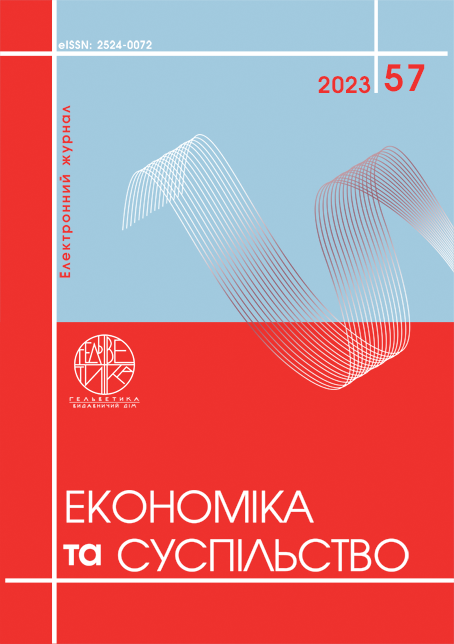MODERN METHODS OF ASSESSING THE EFFICIENCY OF THE RESTAURANT SERVICE MANAGEMENT SYSTEM
Abstract
методи оцінкиThe article deals with the study of modern methods of evaluating the effectiveness of the restaurant service management system. In the 21st century, we are witnessing a rapid growth of trust in technology in the service management of most Ukrainian companies. At the current stage of development of the service sector, information technology (IT) in the service management system of a restaurant business is the driving force that makes a restaurant successful and gives it a sustainable advantage among numerous competitors. The information technology is the key to ensuring the basic needs of all stakeholders of the restaurant business: for managers – efficient and easy management of business processes, for customers – convenient service and personal integration at the modern stage of development of the service sector. It has been observed that modern methods of evaluating the effectiveness of the restaurant service management system are focused on measuring and improving key parameters and results, which affect the success of the business. All methods are divided into two thematic groups: “universal” and “unforeseen circumstances” group. It was determined that the most popular method of evaluating the effectiveness of service management at the modern restaurants is “Balanced Scorecard”. However, this system of measuring the efficiency of restaurant service management system is characterized by a small scale and limited scope. In this regard, the article proposes a practical SOE-approach to evaluating and improving the efficiency of restaurant service management system, developed by Carlos Gomez and Mahmud Yasin. Relevant implementation issues, related to the proposed approach, are also considered. A graphic map of SOE-implementation has been developed to assess the effectiveness of the restaurant service management system, and four stages of its implementation have also been analyzed in detail. Possible risks are identified. The SOE-approach has been found to have operational and strategic implications for restaurant business management. The article presents examples of diagrams which mark the initial verification of the proposed approach to the evaluation of the restaurant service management system. Promising areas of further research can be aimed at analyzing the newest systems for measuring the effectiveness of service management system.
References
Березіна Л. Теоретико-методологічні основи управління конкурентоспроможністю підприємства. Агросвіт. 2021. №21–22. С. 35–42. URL: http://surl.li/kwpfo (дата звернення: 14.07.2023).
Панова І., Зерненкова Д. Методи оцінки конкурентноспроможності підприємств ресторанного бізнесу. Бізнесінформ. 2023. №5. С. 229–234. URL: http://surl.li/kwppd (дата звернення: 16.08.2023).
Повна С. Світовий досвід запровадження гнучких методологій управління конкурентоспроможністю підприємств та організацій. Проблеми і перспективи економіки та управління. 2020. №1. С. 63–71. URL: http://surl.li/kwpqa (дата звернення: 14.07.2023).
Яцковий Д. Сучасні методики оцінки конкурентоспроможності підприємства. Вісник соціально-економічних досліджень. 2013. Вип. 4(51). С. 183–188. URL: http://surl.li/nfagg (дата звернення: 21.07.2023).
Bourne M. Researching performance measurement system implementation: thedynamics of success and failure. Production Planning & Control. 2005. Vol. 16. №2, P. 101–113. URL: http://surl.li/kwpaa (last accessed: 16.07.2023).
Gomes C., Yasin M. and Lisboa V. An Examination of Manufacturing Organizations Performance Evaluation: Analysis, Implications and a Framework for Future Research. International Journal of Operations & Production Management. 2004. Vol. 24. №5. P. 488–513. URL: http://surl.li/kwpan (last accessed: 22.07.2023).
Gomes K., Yasin M., Lisboa V. The Effectiveness of Hospitality Service Operations: Measurement and Implementation Concerns. International Journal of Contemporary Hospitality Management. 2007. №19(7). P. 560–573. URL: http://surl.li/kwpbe (last accessed: 16.07.2023).
Kaplan S., Norton P. Measuring the Strategic Readiness of Intangible Assets. Harvard Business Review. 2004 Vol. 82. №2 P. 52–63. URL: http://surl.li/kwpcy (last accessed: 16.07.2023).
Moullin M. Eight essentials of performance measurement. International Journal of Health Care Quality Assurance. 2004. Vol. 17. №3. P. 110–112. URL: http://surl.li/nfaft (last accessed: 16.07.2023).
Neely A., Adams Ch., Crowe P. The Performance Prism in Practice. Measuring Business Excellence. 2001. Vol. 5. №2. P. 6–11. URL: http://surl.li/nfafz (last accessed: 16.07.2023).
Berezina L. (2021) Teoretyko-metodolohichni osnovy upravlinnia konkurentospromozhnistiu pidpryiemstva [Theoretical and methodological foundations of enterprise competitiveness management]. Agrosvit. Issue 21–22. P. 35–42. http://surl.li/kwpfo (in Ukrainian).
Panova I., Zernenkova D. (2023) Metody otsinky konkurentnospromozhnosti pidpryiemstv restorannoho biznesu [Methods of assessing the competitiveness of restaurant business enterprises]. Bisnesinform. Issue 5. P. 229–234. http://surl.li/kwppd (in Ukrainian).
Povna S. (2020) Svitovyi dosvid zaprovadzhennia hnuchkykh metodolohii upravlinnia konkurentospromozhnistiu pidpryiemstv ta orhanizatsii [World experience in introducing flexible methodologies for managing the competitiveness of enterprises and organizations]. Problemy i perspektyvy ekonomiky ta upravlinnia. Issue 1. P. 63–71. http://surl.li/kwpqa (in Ukrainian).
Yatskovyi D. (2013) Suchasni metodyky otsinky konkurentospromozhnosti pidpryiemstva [Modern methods of assessing the competitiveness of the enterprise]. Visnyk sotsialno-ekonomichnykh doslidzhen. 2013. Vol. 4. Issue 51. P. 183–188. http://surl.li/nfagg (in Ukrainian).
Bourne M. (2005) Researching performance measurement system implementation: thedynamics of success and failure. Production Planning & Control. Vol. 16. Issue 2, P. 101–113. http://surl.li/kwpaa (in English).
Gomes C., Yasin M. and Lisboa V. (2004) An Examination of Manufacturing Organizations Performance Evaluation: Analysis, Implications and a Framework for Future Research. International Journal of Operations & Production Management. Vol. 24. Issue 5. P. 488–513. http://surl.li/kwpan (in English).
Gomes K., Yasin M., Lisboa V. (2007) The Effectiveness of Hospitality Service Operations: Measurement and Implementation Concerns. International Journal of Contemporary Hospitality Management. Vol. 19. Issue 7. P. 560–573. http://surl.li/kwpbe (in English).
Kaplan S., Norton P. (2004) Measuring the Strategic Readiness of Intangible Assets. Harvard Business Review. Vol. 82. Issue 2 P. 52–63. http://surl.li/kwpcy (in English).
Moullin M. (2004) Eight essentials of performance measurement. International Journal of Health Care Quality Assurance. Vol. 17. Issue 3. P. 110–112. http://surl.li/nfaft (in English).
Neely A., Adams Ch., Crowe P. (2001) The Performance Prism in Practice. Measuring Business Excellence. Vol. 5. Issue 2. P. 6–11. http://surl.li/nfafz (in English).

This work is licensed under a Creative Commons Attribution 4.0 International License.


